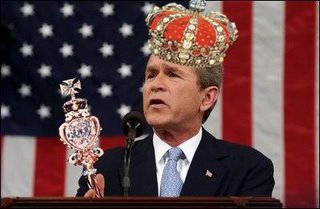
"I tell you, he's President George Bush, not King George Bush."
In a very unusual live radio broadcast today, Bush angrily defended his secret policy of spying on American citizens and foreign nationals. The Commander, hell-bent on sovietizing the U.S., confessed that he has secretly authorized spying on American citizens, and he has done so more than 30 times.
Much of what Bush had to say was identical - "word for word" - to statements "issued Friday night by a senior intelligence official who spoke on condition of anonymity."
The Commander said:
"I have reauthorized this program more than 30 times since the September the 11th attacks, and I intend to do so for as long as our nation faces a continuing threat from al Qaeda and related groups."
In other words, George W. Bush is The Commander, and don't you forget it.
In the United States of America, there are legal prohibitions against spying on American citizens. But why should a little thing like U.S. law get in the way of the my-way-or-the-highway president?
It is painfully obvious that Bush has as much disrespect for U.S. law as he does for international law.
"The super-secretive NSA . . has monitored the e-mail, telephone calls and other communications of hundreds, and perhaps thousands, of people under the program, the New York Times disclosed last night. . .
The Times said it held off on publishing its story about the NSA program for a year after administration officials said its disclosure would harm national security. . .
Kate Martin, director of the Center for National Security Studies, said the secret order may amount to the president authorizing criminal activity.
The law governing clandestine surveillance in the United States, the Foreign Intelligence Surveillance Act, prohibits conducting electronic surveillance not authorized by statute. A government agent can try to avoid prosecution if he can show he was "engaged in the course of his official duties and the electronic surveillance was authorized by and conducted pursuant to a search warrant or court order of a court of competent jurisdiction," according to the law.
"This is as shocking a revelation as we have ever seen from the Bush administration," said Martin, who has been sharply critical of the administration's surveillance and detention policies. "It is, I believe, the first time a president has authorized government agencies to violate a specific criminal prohibition and eavesdrop on Americans."
In his live radio broadcast today, Bush slammed the senators who are blocking the passage of the Patriot Act.
It's not clear why he cares. Obviously, the all-powerful pResident does not need the Patriot Act. It really doesn't matter if the Patriot Act passes, or not, since our Commander will continue to do whatever he damn well pleases.
Sen. Dianne Feinstein (D-Calif.), a member of the intelligence and judiciary committees, said, "How can I go out, how can any member of this body go out, and say that under the Patriot Act we protect the rights of American citizens if, in fact, the president is not going to be bound by the law?"
All of this brings to mind one of the Commander's many infamous statements:
"If this were a dictatorship, it would be a heck of a lot easier - just so long I'm the dictator." -- George W. Bush, December 18, 2000 -- CNN transcript ( Video here )
Bush Spying The Commander King George Patriot Act Feingold Feinstein Evil Empire